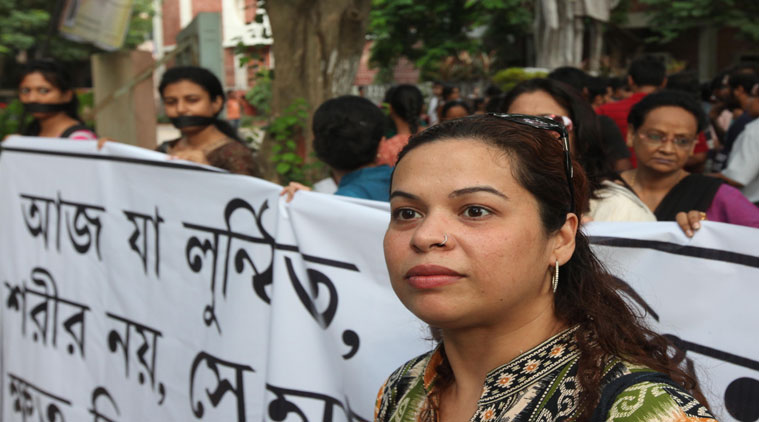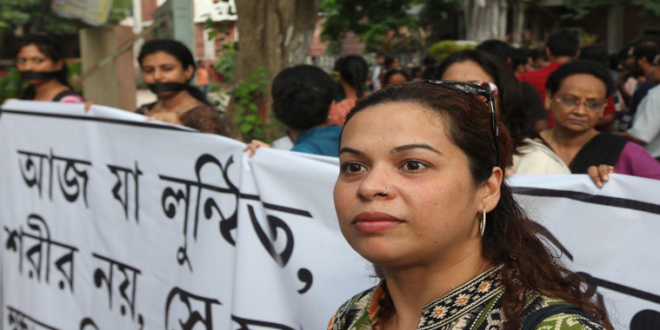
 Park street rape victim Suzzet Jordon during the walk with the research Scholars of Jadavpur University in Kolkata (Express photo by Partha Paul)
Park street rape victim Suzzet Jordon during the walk with the research Scholars of Jadavpur University in Kolkata (Express photo by Partha Paul)
I’m just another woman. A simple woman who loves her family, loves her children and will not take crap.” That’s how Suzette Jordan described herself the first time I met her. That was in 2013 and just a few weeks ago, Suzette had waived her right to anonymity as a rape survivor and revealed her name and face on television. “I want to fight wide open so that people can see me and see my pain,” she explained. “This is my way of fighting. Besides, I have nothing to be ashamed of.”
On the night of February 5, 2012, a gang of men raped Suzette in her hometown, Kolkata. She recounted to me the traumatic event: “I tried to open the car but the door was auto-locked. He started to beat me up. When he shoved a gun into my mouth, I thought it was the end. I couldn’t breathe or swallow. I could taste my own blood. He was trying to strangulate me. And then he laughed. The others were cheering.
“I was consumed with fright and rage. It’s a terrible feeling — like you’re alive but somebody has buried you in a coffin. Even after he raped me, he beat me as if there were an age-old vendetta between us. But we didn’t know each other at all. He kept asking his friends to rape me. He had the power. And that made him feel good about himself.”
Barely alive, Suzette was thrown out of the moving car a few hours later. One thought gave her the strength to get home — “I am alive and I can see my children”. For three days, Suzette couldn’t leave the bed. Her older daughter, a teenager, stood beside her like a rock. “She was like a mother to me,” said Suzette. “So compassionate, understanding. Rhea just held me, let me cry, nursed me, took care of me.” On day four, bolstered by family, she reached the police station. “I made a conscious choice to file a complaint. People advised me to keep quiet, forget about it. That I would be buying myself a lot of trouble. But I wanted to fight for justice.”
Horrible and humiliating were the words Suzette used to describe the filing of the FIR. “Each and every policeman there came one by one and asked me, ‘Are you sure you were actually raped?’ ‘How was it possible to be raped in a car?’ ‘What were the positions in which you were raped?’ A prisoner in the lock-up there who had been held for the rape of an 11-year-old girl also heard the entire conversation!” The doctor at the public hospital, too, lacked compassion. Said Suzette, “He asked me to narrate my story in full public view. Then, during the physical examination, he actually commented on my tattoo. ‘Hmm. Nice tattoo,’ he said.”
Her determination to pursue the case cost Suzette. There was public humiliation at the hands of Chief Minister Mamata Banerjee, who insinuated that her story had been cooked up to malign her government. She was dubbed a prostitute, stigmatised, denied employment. Then came death threats from her attackers. Yet, despite the odds, she never failed to speak of her “angels” — her family, friends, lawyers and police officers like Damayanti Sen, who investigated her case and concluded she was telling the truth.
Over time, Suzette and I became friends. I was amazed at how she celebrated life. There were many terrible days at court. She had very few means, was finding it hard to get a job. But she pursued happiness with determination. “Just because I have been raped, people feel I have no right to live and I certainly have no right to be happy. I feel as if I am being blamed for being alive. But why shouldn’t I enjoy life?” she would say. Suzette grew into an iconic figure, raising the humanitarian concerns of survivors of sexual violence at various forums with great eloquence.
So sparklingly alive was she that her death came as a terrible shock. In March this year, Suzette succumbed to encephalitis. At a memorial meeting we organised in Mumbai, dozens of people, even those who had never met her, spoke about Suzette touching their lives. I was reminded of something Suzette had said: “If I had chosen to just accept injustice submissively, I would never be the right role model for my daughters.”
When I visited her grave in Kolkata, I felt her presence as I gazed at her photograph, lovingly placed by her children on her grave. But I was worried about the fate of the case. There was news that her attackers, on hearing of her demise, were distributing sweets in anticipation of their freedom. Clearly, I had underestimated the power of Suzette’s determination. Even in death, she didn’t back down. On December 10, a Kolkata court held three men guilty of raping Suzette Jordan. She had won.
![]()
Source: New feed






